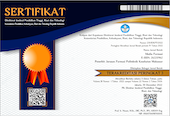Kesiapan Masyarakat Untuk Vaksinasi Covid-19 (Online Survey)
Abstract
Covid-19 is a respiratory infection disease caused by the corona virus (SARS CoV-2) which has caused a worldwide pandemic. Various efforts have been made to stop the COVID-19 pandemic, such as carrying out health protocols to research to find drugs and vaccines. The Covid-19 vaccine is the hope of the world including Indonesia to stop this pandemic by establishing herd immunity, but a group of people still doubt the Covid-19 vaccine and refuse to vaccinate. The purpose of this study was to determine the readiness of the community to vaccinate against COVID-19 in Indonesia. The research method is an online survey by collecting respondent data using a google form which is distributed through WhatsApp social media. The survey involved 210 respondents from various regions in Indonesia with varying educational and occupational characteristics The results of the study found that the level of knowledge of respondents about Covid-19 was 84.76% (high category). Respondents' level of confidence in the covid vaccine was 19 93.33%, but respondents who were willing to be vaccinated were 49.53%, doubtful 31.90% and refused 18.57%. However, 68.1% of respondents are willing to recommend the Covid-19 vaccination. Respondents' expectations for the success of the vaccine to overcome Covid-19 were 83.81%. In total, the readiness of the community represented by respondents was 76.19% ready and 23.81% hesitant to participate in the Covid-19 vaccination. Effective communication is urgently needed to educate people who are still hesitant to participate in the COVID-19 vaccination.
Keywords: vaccination, Covid-19, community readiness
Covid-19 adalah penyakit infeksi saluran napas yang disebabkan oleh virus corona (SARS CoV-2) yang mengakibatkan pandemic di seluruh dunia. Berbagai upaya telah dilakukan untuk menghentikan pandemic Covid-19 seperti melakukan protocol kesehatan hingga penelitian untuk menemukan obat dan vaksin. Vaksin Covid-19 merupakan harapan dunia termasuk Indonesia untuk menghentikan pandemi ini dengan membentuk herd immunity, namun sekelompok orang masih meragukan vaksin Covid-19 dan menolah untuk vaksinasi. Tujuan penelitian ini untuk mengetahui kesiapan masyarakat melakukan vaksinasi Covid-19 di Indonesia. Metode penelitian adalah survey online dengan mengumpulkan data responden menggunakan google form yang disebarkan melalui media sosial WhatsApp. Survey melibatkan 210 responden yang berasal dari berbagai daerah di Indonesia dengan karakteristik pendidikan dan pekerjaan yang bervariasi. Hasil penelitian menemukan bahwa tingkat pengetahuan responden terhadap Covid-19 adalah 84,76% (kategori tinggi). Tingkat kepercayaan responden terhadap vaksin covid adalah 19 93,33% namun responden yang bersedia divaksin 49,53%, ragu-ragu 31,90% dan menolak 18,57%. Sejumlah 68,1% responden bersedia merekomendasikan vaksinasi Covid-19. Harapan responden terhadap keberhasilan vaksin mengatasi Covid-19 adalah 83,81%. Hasil penelitian menyimpulkan bahwa kesiapan masyarakat yang diwakili oleh responden adalah 76,19% siap dan 23,81% ragu-ragu mengikuti vaksinasi Covid-19. Komunikasi yang efektif sangat dibutuhkan untuk mengedukasi masyarakat yang masih ragu mengikuti vaksinasi Covid-19.
Kata kunci: vaksinasi, Covid-19, kesiapan masyarakat
Full Text:
PDF (Bahasa Indonesia)References
Afolabi, A. A., & Ilesanmi, O. S. 2021. Dealing with vaccine hesitancy in Africa: The prospective COVID-19 vaccine context. Pan African Medical Journal, 38. https://doi.org/10.11604/pamj.2021.38.3.27401
Coe, A. B., Elliott, M. H., Gatewood, S. B. S., Goode, J. V. R., & Moczygemba, L. R. 2021. Perceptions and predictors of intention to receive the COVID-19 vaccine. Research in Social and Administrative Pharmacy. https://doi.org/10.1016/j.sapharm.2021.04.023
Jeyanathan, M., Afkhami, S., Smaill, F., Miller, M. S., Lichty, B. D., & Xing, Z. 2020. Immunological considerations for COVID-19 vaccine strategies. In Nature Reviews Immunology (Vol. 20, Issue 10). https://doi.org/10.1038/s41577-020-00434-6
Karlsson, L. C., Soveri, A., Lewandowsky, S., Karlsson, L., Karlsson, H., Nolvi, S., Karukivi, M., Lindfelt, M., & Antfolk, J. 2021. Fearing the disease or the vaccine: The case of COVID-19. Personality and Individual Differences, 172. https://doi.org/10.1016/j.paid.2020.110590
Kashte, S., Gulbake, A., El-Amin, S. F., & Gupta, A. 2021. COVID-19 vaccines: rapid development, implications, challenges and future prospects. In Human Cell (Vol. 34, Issue 3). https://doi.org/10.1007/s13577-021-00512-4
Kwok, K. O., Li, K. K., WEI, W. I., Tang, A., Wong, S. Y. S., & Lee, S. S. 2021. Influenza vaccine uptake, COVID-19 vaccination intention and vaccine hesitancy among nurses: A survey. International Journal of Nursing Studies, 114. https://doi.org/10.1016/j.ijnurstu.2020.103854
Lie, X., Geng, M., Peng, Y., Meng, L., & Lu, S. 2020. Molecular immune pathogenesis and diagnosis of COVID-19. In Journal of Pharmaceutical Analysis (Vol. 10, Issue 2). https://doi.org/10.1016/j.jpha.2020.03.001
MacDonald, N. E., Comeau, J., Dubé, E., Bucci, L., & Graham, J. E. 2020. A public health timeline to prepare for COVID-19 vaccines in Canada. Canadian Journal of Public Health, 111(6). https://doi.org/10.17269/s41997-020-00423-1
Malik, A. A., McFadden, S. A. M., Elharake, J., & Omer, S. B. 2020. Determinants of COVID-19 vaccine acceptance in the US. EClinicalMedicine, 26. https://doi.org/10.1016/j.eclinm.2020.100495
Sallam, M. 2021. Covid-19 vaccine hesitancy worldwide: A concise systematic review of vaccine acceptance rates. In Vaccines (Vol. 9, Issue 2). https://doi.org/10.3390/vaccines9020160
Soares, P., Rocha, J. V., Moniz, M., Gama, A., Laires, P. A., Pedro, A. R., Dias, S., Leite, A., & Nunes, C. 2021. Factors associated with COVID-19 vaccine hesitancy. Vaccines, 9(3). https://doi.org/10.3390/vaccines9030300
Ullah, I., Khan, K. S., Tahir, M. J., Ahmed, A., & Harapan, H. 2021. Myths and conspiracy theories on vaccines and COVID-19: Potential effect on global vaccine refusals. In Vacunas (Vol. 22, Issue 2). https://doi.org/10.1016/j.vacun.2021.01.001
DOI: https://doi.org/10.32382/mf.v17i2.2252
Refbacks
- There are currently no refbacks.

This work is licensed under a Creative Commons Attribution-NonCommercial-ShareAlike 4.0 International License.
Kontak Editor
Hendra Stevani
Jurusan Farmasi Poltekkes kemenkes Makassar
email : hendra@poltekkes-mks.ac.id

This work is licensed under a Creative Commons Attribution-ShareAlike 4.0 International License.





.png)


